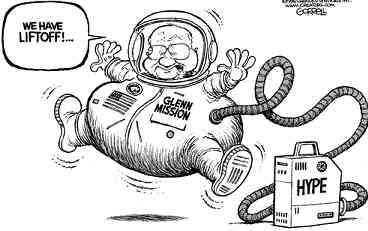|
|
Jewish World Review /Nov. 13, 1998 /24 Mar-Cheshvan, 5759
Ben Wattenberg
Wolfe has returned, after a long absence, to the hardcover-fiction shelves with A Man in Full,
and Glenn has returned, after a far longer absence, to orbit. Both returns
have been powered by 7 million-pounds of rocket-fueled hype, it's true, but
these two have earned their victory rolls.
Yes, Glenn's flight was a triumph of symbolism over science, but -- reread
The Right Stuff -- hoopla and heroism have coexisted in the space program
from the start. And what symbolism!
For an aging American, a septuagenarian
doing somersaults in space is just what the gerontologist ordered.
Wolfe's new novel needs no qualification by reference to the author's age,
although he himself is 69. "A Man in Full" brims with Wolfe's photo-realist
detail, and it may be his most explicit lament yet for the decline of the
older, heroic virtues, personified here by protagonist Charlie Croker --- a
self-made, risk-taking, mightily over-leveraged real estate developer.
Charlie's debts ($500 million to one bank alone!) confront him with a nasty
dilemma: Gain relief from his creditors by participating in a
political/public-relations charade that betrays both his friends and his own
code of honor? Or stay true to himself, at the cost of his fortune and
social standing?
Charlie has conquered the world only to find that the world has left him
behind. His old linebacker's body doesn't belong amid the decorator touches
with which his fair-weather second wife has appointed their house in
Atlanta's exclusive Buckhead. His cracker bonhomie comes off as gauche to
the New South social elites aping the politically correct manners of their
Yankee betters. And his warrior soul is an object of silent condescension
(albeit tinged with awe) to the number-crunching M.B.A.s taking over the
boardrooms.
"A Man in Full" is entirely of its moment in its documentary details and
many topical social themes. But it appraises contemporary mores, severely,
in the long perspective of a 69-year-old man looking backward. Charlie's
social-climbing and pretentious young second wife, Serena, doesn't measure
up to his socially secure and self-sacrificing first wife. Charlie swells
with ambition and joie de vivre; his disappointing son Wally is, by
contrast, "a boy utterly world-weary by the age of sixteen, cynical,
phlegmatic and apathetic around adults ... embarrassed by his advantages,
desperate to hide them."
It's easy to forget, but a mood of loss and corruption of an older, more
pure code of values also haunted The Right Stuff. The "right stuff" was
the elite ethos of an exclusive fraternity of test pilots, molded to the
special pressures and demands of their dangerous vocation. As test pilots
became astronauts, these small-unit values were tainted.
The purest embodiment of the right stuff was Chuck Yeager, not John Glenn.
Wolfe's Glenn was a true combat hero in World War II and Korea, and
possessor (in spades) of the right stuff -- but in a combination adulterated
by the image-conscious apple-polishing of the personality ethic.
He was more media-friendly and bureaucracy-savvy than the unsung pilots of
Edwards Air Force Base who broke the sound barrier. He was an enthusiastic
test subject for the Mercury program's aero-medical experiments on the
effects of weightlessness on the central nervous system (some things never
change!), while truer representatives of the breed resented being reduced to
"lab rabbits with wires up the tail and everywhere else." The straight-laced
"Deacon Glenn" frowned on the drinking and joyriding and skirt-chasing, the
cathartic "regrouping" that fighter jocks who lived in the shadow of death
allowed themselves in order to "maintain an even strain."
The allegiances of the insular test pilot fraternity were to their shared
vocation, and to each other. Glenn recognized a competing loyalty -- to the
expectations of the Mercury 7 astronauts' adoring new public. And he more
than anyone built those expectations. Glenn, wrote Wolfe, painted an
"amazing picture of the Perfect Pilot wrapped up in a cocoon of Home and
Hearth and God and Flag," and henceforth the astronauts "would be served up
inside the biggest slice of Mom's Pie you could imagine."
In Glenn, the rough-cut warrior spirit that Wolfe named the Right Stuff was
carved into a marble idol suitable for public worship. Of course, it takes
both the spirit and the salesmanship to make an icon, and John Glenn has
proved again why he is one of our greatest icons. And Tom Wolfe has proved
once again why he is one of our greatest
 The icon and the iconoclast
The icon and the iconoclast
THE DESTINIES OF TOM WOLFE AND JOHN GLENN have crossed again, almost
20 years after the publication of The Right Stuff, Wolfe's best-selling
chronicle of the early years of American space flight.


11/06/98: What happened? Nothing!
10/28/98: Two billion never-borns!
10/22/98: Election pundits know nothing
10/15/98: The too-big-to-fail doctrine
9/29/98: The Jerk Factor at work
9/24/98: American civic engagement thriving
9/16/98: Anatomy of a cover-up
9/09/98: Draft Joe Lieberman!
9/03/98: Get over it, folks
8/28/98: McGwire. Maris. Ruth. Clinton.
8/20/98: Is consuming a Big Mac eating?
Ben Wattenberg is a senior fellow at the
American Enterprise Institute
and is the moderator of PBS's "Think Tank." He wrote this column together with his son, Daniel